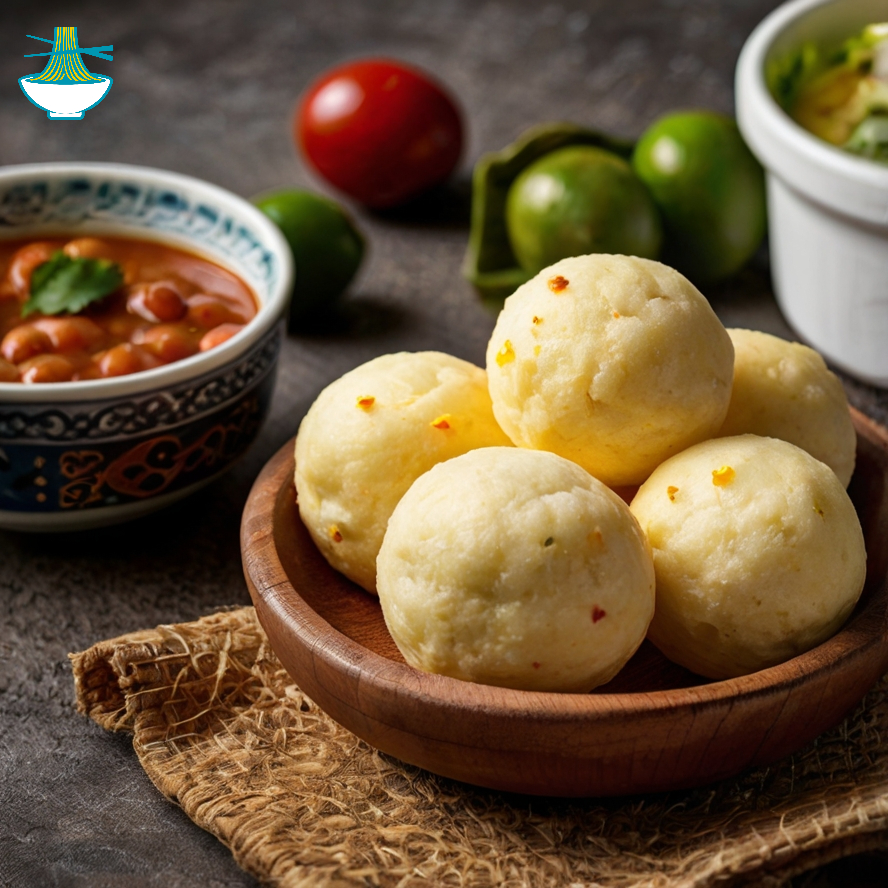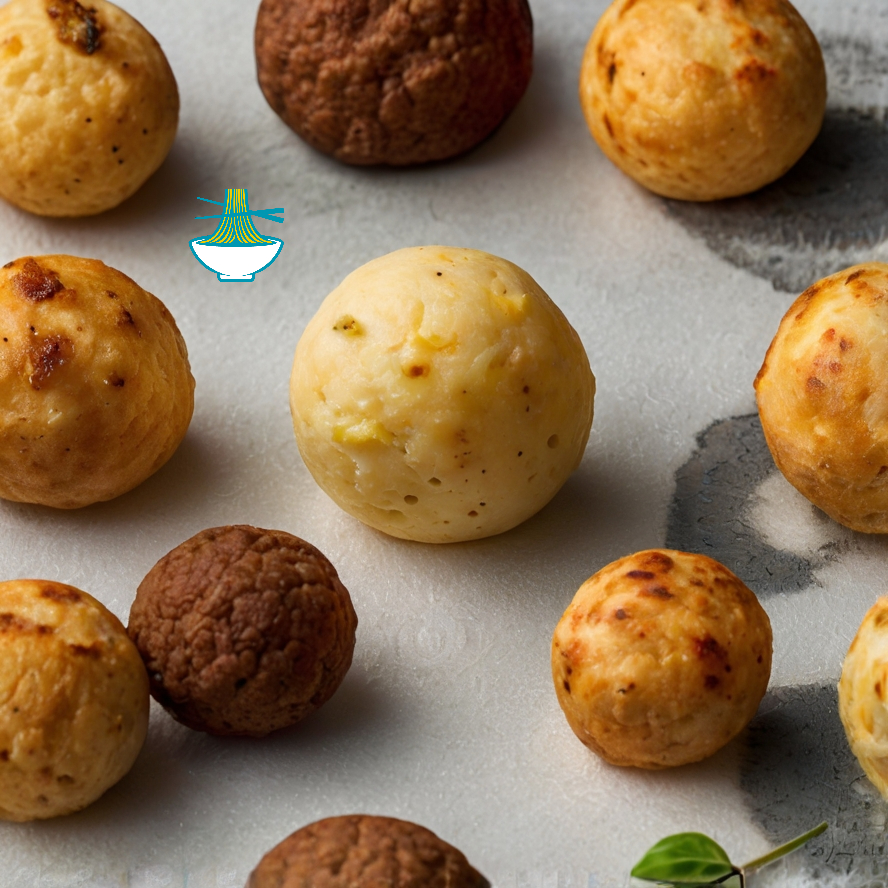Pão de queijo, or Brazilian cheese bread, is a cherished Brazilian snack renowned for its delightful texture and flavor. Originating from the state of Minas Gerais, this delectable treat is made from tapioca flour and cheese, resulting in a light, airy, and slightly chewy bread. The traditional cheese used in this recipe is Minas cheese, a local favorite, but other cheeses can be used based on availability and preference.

Pão de queijo's roots trace back to the 17th century, influenced by indigenous ingredients and techniques combined with Portuguese culinary traditions. Tapioca flour, derived from cassava, was introduced by indigenous Brazilians and became a staple ingredient in various dishes. Over time, pão de queijo evolved as a popular snack, especially in Minas Gerais, where cheese production is a longstanding tradition. The bread gained widespread recognition across Brazil and beyond, celebrated for its unique taste and gluten-free properties.
Ingredients:
- 2 cups tapioca flour
- 1/2 cup vegetable oil
- 1/2 cup water
- 1/2 cup milk
- 2 eggs
- 1 teaspoon salt
- 1 cup grated cheese (traditionally Minas cheese, but other cheeses can be used)
Directions:
1. Preheat the oven to 375°F (190°C).
2. In a saucepan, combine vegetable oil, water, milk, and salt. Heat over medium heat until the mixture comes to a boil.
3. Place the tapioca flour in a mixing bowl.
4. Pour the boiling liquid over the tapioca flour, stirring well to combine.
5. Add eggs to the mixture and stir until fully integrated.
6. Stir in the grated cheese until evenly distributed.
7. Grease a mini muffin tin with vegetable oil.
8. Spoon the mixture into the muffin tin, filling each cavity about 3/4 full.
9. Bake for 15-20 minutes, or until the pão de queijo are golden brown on the outside.
Notes:
- Pão de queijo can be enjoyed hot or cold and stored in an airtight container for up to 3 days.
- The recipe is flexible and can be adjusted based on serving needs.
- Tapioca flour is widely available in grocery stores or online.

Nutrition Value:
1. 2 cups tapioca flour
- Calories: Approximately 480 calories
- Carbohydrates: About 120 grams
- Protein: 0 grams
- Fat: 0 grams
- Sodium: 0 milligrams
- Cholesterol: 0 milligrams
- Vitamins: Tapioca flour is low in vitamins but may contain trace amounts of Vitamin B6.
- Minerals: Contains small amounts of calcium, iron, and magnesium.
- Nutritional Benefit: Tapioca flour is a gluten-free starch that provides a light texture in baked goods, making it suitable for those with gluten sensitivities.
2. 1/2 cup vegetable oil
- Calories: Approximately 960 calories
- Carbohydrates: 0 grams
- Protein: 0 grams
- Fat: 108 grams
- Sodium: 0 milligrams
- Cholesterol: 0 milligrams
- Vitamins: Some vegetable oils contain Vitamin E, though the amount varies by type.
- Minerals: Generally minimal amounts.
- Nutritional Benefit: Vegetable oil provides healthy fats essential for energy and cell function. It also helps achieve a desirable texture in baked goods.
3. 1/2 cup water
- Calories: 0 calories
- Carbohydrates: 0 grams
- Protein: 0 grams
- Fat: 0 grams
- Sodium: 0 milligrams
- Cholesterol: 0 milligrams
- Vitamins: Contains no vitamins.
- Minerals: Contains no minerals.
- Nutritional Benefit: Water is crucial for the hydration and proper functioning of the body. It helps dissolve other ingredients and assists in the cooking process.
4. 1/2 cup milk
- Calories: Approximately 60 calories
- Carbohydrates: 6 grams
- Protein: 3 grams
- Fat: 3 grams
- Sodium: 50 milligrams
- Cholesterol: 15 milligrams
- Vitamins: Rich in Vitamin D and Vitamin B12.
- Minerals: Good source of calcium and phosphorus.
- Nutritional Benefit: Milk provides protein, vitamins, and minerals necessary for bone health and overall nutrition.
5. 2 eggs
- Calories: Approximately 140 calories
- Carbohydrates: 2 grams
- Protein: 12 grams
- Fat: 10 grams
- Sodium: 140 milligrams
- Cholesterol: 370 milligrams
- Vitamins: Excellent source of Vitamin A, Vitamin D, and Vitamin B12.
- Minerals: Contains iron, calcium, and phosphorus.
- Nutritional Benefit: Eggs are a high-quality protein source and provide essential nutrients for muscle maintenance and overall health.
6. 1 teaspoon salt
- Calories: 0 calories
- Carbohydrates: 0 grams
- Protein: 0 grams
- Fat: 0 grams
- Sodium: Approximately 2,300 milligrams
- Cholesterol: 0 milligrams
- Vitamins: Contains no vitamins.
- Minerals: Provides sodium, which is essential for fluid balance and nerve function.
- Nutritional Benefit: Salt enhances flavor but should be used in moderation to maintain a balanced diet.
7. 1 cup grated cheese (traditionally Minas cheese)
- Calories: Approximately 400 calories
- Carbohydrates: 2 grams
- Protein: 25 grams
- Fat: 30 grams
- Sodium: 800 milligrams
- Cholesterol: 80 milligrams
- Vitamins: Good source of Vitamin A and Vitamin B12.
- Minerals: High in calcium and phosphorus.
- Nutritional Benefit: Cheese provides protein, calcium, and other essential nutrients that support bone health and muscle function. The fat content also contributes to flavor and texture.
Each ingredient in pão de queijo contributes distinct nutritional benefits, enhancing the overall flavor and texture of the bread while providing essential nutrients.


Comments